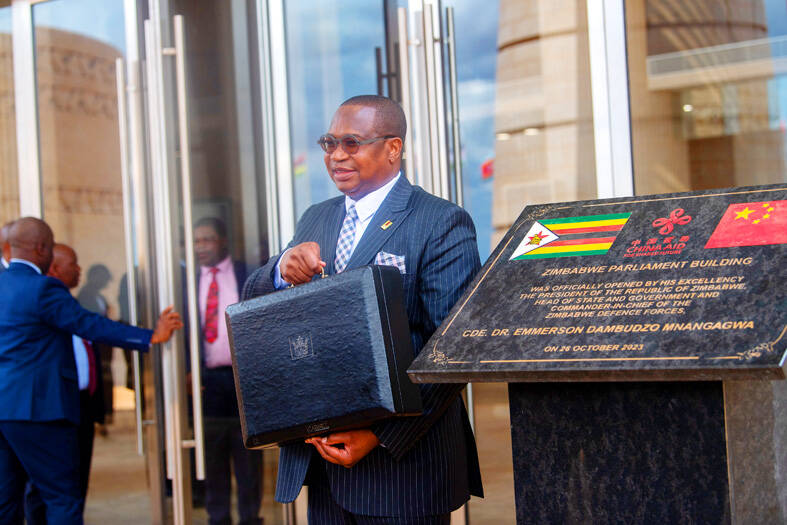Zimbabwe has started to make compensation payments to white former farm owners, 25 years after then-Zimbabwean president Robert Mugabe’s government began confiscating land.
The government paid US$3.1 million to a “first batch” of 378 farms, the Zimbabwean Ministry of Finance and Investment Promotion said in a statement on Wednesday, the first payout under a 2020 agreement to pay US$3.5 billion in compensation.
The remainder of the US$311 million due to this group of farmers would be paid in US dollar-denominated treasury bonds with two to 10-year maturities and interest of 2 percent.

Photo: EPA-EFE
That is much lower than the current yield on a two-year US treasury bond of about 3.8 percent.
Zimbabwean Ministry of Finance and Investment Promotion Mthuli Ncube said: “The payments will continue. We are very serious about this.”
Mugabe’s government seized more than 4,000 mostly white-owned farms, often violently, from about the year 2000 to redistribute to black people in what it claimed was restitution for the dispossession of British colonial rule.
However, Mugabe and his cronies took nearly 40 percent of the 14 million hectares confiscated for themselves, a 2010 investigation by local news outlet ZimOnline showed.
Agricultural production, which had accounted for 40 percent of exports, plunged and the economy collapsed, with hyperinflation reaching 89.7 sextillion percent in 2008, the second-highest hyperinflation in history, according to the Cato Institute.
Zimbabwe cannot borrow from the World Bank and the IMF as it has been in arrears since 2000 and 2001, respectively. Government debt was US$21 billion late last year, about half of which was arrears and penalties.
The compensation payments to the displaced farmers are one of the requirements of international lenders to start a debt restructuring process with Zimbabwe, including a new IMF program.
Andrew Pascoe, who signed the 2020 compensation deal while head of the Commercial Farmers’ Union, confirmed the first payments had been received on March 24 and thanked Zimbabwe’s government, in comments included in the Zimbabwean finance ministry’s statement. He said: “We are extremely grateful.”
However, Tony Hawkins, a retired University of Zimbabwe professor of economics, said the payments are a “publicity stunt,” adding that the US could block an IMF program.
A US law “restricts US support for multilateral financing to Zimbabwe until Zimbabwe makes concrete governance and economic reforms,” the US Department of State said.
Regarding using government bonds to pay farmers, Hawkins said: “We continue to accumulate arrears because we are unable to service our foreign debt, so we can’t really afford to take on new debt commitments.”
“It’s derisory, the more you look at it,” he added.
About 1,000 former farmers had signed up for compensation, said Harry Orphanides, one of Pascoe’s co-negotiators.
“Look, it’s not a perfect deal, but there was no other alternative,” he said.

With much pomp and circumstance, Cairo is today to inaugurate the long-awaited Grand Egyptian Museum (GEM), widely presented as the crowning jewel on authorities’ efforts to overhaul the country’s vital tourism industry. With a panoramic view of the Giza pyramids plateau, the museum houses thousands of artifacts spanning more than 5,000 years of Egyptian antiquity at a whopping cost of more than US$1 billion. More than two decades in the making, the ultra-modern museum anticipates 5 million visitors annually, with never-before-seen relics on display. In the run-up to the grand opening, Egyptian media and official statements have hailed the “historic moment,” describing the

SECRETIVE SECT: Tetsuya Yamagami was said to have held a grudge against the Unification Church for bankrupting his family after his mother donated about ¥100m The gunman accused of killing former Japanese prime minister Shinzo Abe yesterday pleaded guilty, three years after the assassination in broad daylight shocked the world. The slaying forced a reckoning in a nation with little experience of gun violence, and ignited scrutiny of alleged ties between prominent conservative lawmakers and a secretive sect, the Unification Church. “Everything is true,” Tetsuya Yamagami said at a court in the western city of Nara, admitting to murdering the nation’s longest-serving leader in July 2022. The 45-year-old was led into the room by four security officials. When the judge asked him to state his name, Yamagami, who

DEADLY PREDATORS: In New South Wales, smart drumlines — anchored buoys with baited hooks — send an alert when a shark bites, allowing the sharks to be tagged High above Sydney’s beaches, drones seek one of the world’s deadliest predators, scanning for the flick of a tail, the swish of a fin or a shadow slipping through the swell. Australia’s oceans are teeming with sharks, with great whites topping the list of species that might fatally chomp a human. Undeterred, Australians flock to the sea in huge numbers — with a survey last year showing that nearly two-thirds of the population made a total of 650 million coastal visits in a single year. Many beach lovers accept the risks. When a shark killed surfer Mercury Psillakis off a northern Sydney beach last

‘CHILD PORNOGRAPHY’: The doll on Shein’s Web site measure about 80cm in height, and it was holding a teddy bear in a photo published by a daily newspaper France’s anti-fraud unit on Saturday said it had reported Asian e-commerce giant Shein (希音) for selling what it described as “sex dolls with a childlike appearance.” The French Directorate General for Competition, Consumer Affairs and Fraud Control (DGCCRF) said in a statement that the “description and categorization” of the items on Shein’s Web site “make it difficult to doubt the child pornography nature of the content.” Shortly after the statement, Shein announced that the dolls in question had been withdrawn from its platform and that it had launched an internal inquiry. On its Web site, Le Parisien daily published a